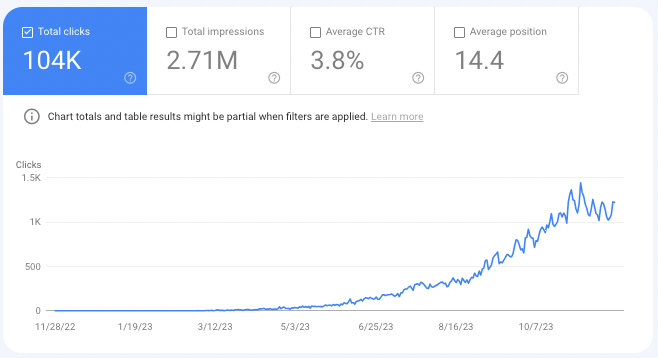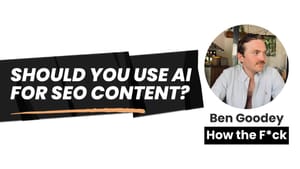7 thoughts on AI in SEO content creation and where I'm using it
It's been a wild week for SEO.
(actually, I'd argue it's been a wild year...alas)
Twitter has been ablaze with debate on the use of AI for content generation for the purposes of growing search traffic.
I was particularly intrigued by this shakedown of Sports Illustrated and was reminded that News is defined as "what someone, somewhere, doesn't want reported."
I was also personally quite disappointed at the shaming and venom people pointed toward some individuals on Twitter.
(I agree with Ryan Darani's Tweet here particularly that death threats are not OK. That certainly wasn't on my 2023 bingo card. And encourage everyone to read this post by Amy Volas.)
Wherever people fall in the AI content debate, it's important to remember we're all dumb apes living on a rock in space. Sometimes it feels like the SEO world is more polarised than US politics. 😉
So, anyway, I've been stewing on AI content for over a year now and thought there's likely no better time to share my opinions (of which we all clearly need more /s).
This won't be too long a read, but I'll share where I'm at right now and where I'm dipping my toe in 2024.
I'd love to hear your thoughts and current conclusions, too.
7 thoughts on AI in SEO content creation and where I'm using it
1/ In the past year my team has published about 20 articles (out of 100s) with the help of ChatGPT.
These articles were:
- A simple topic
- All followed the same pattern "How to do X with Y"
- The content all followed the same heading structure (which is why we spotted the opportunity to scale our processes)
We took a ChatGPT-assisted approach, which felt right because the topic didn't require any deep expertise.
The structure of the 20+ articles were also so similar that I felt we could tightly control inputs to get an output that didn't compromise reader experience.
A writer I really trust created each article (more on why that's important later). We still edited, added screenshots/graphics, and wrote the introductions ourselves.

(Overall costs per article were about £100 lower. Not huge, due to the intensive human input required, but not nothing across 20 articles).
2/ I'm never publishing AI content that hasn't been fact-checked and edited.
This is especially important on ethically risky topics, like "how to stop bullying?", where there are real-world consequences to inaccurate information.
But, in general, I have a strong aversion to content that promises to help readers, yet fails. I think it can be destructive to a brand and is ultimately a waste of time.
So even if the topic is simple, like "how to turn off my computer", I'm not letting it into the world without meeting minimum quality standards:
- We wholly believe the writing to be accurate.
- The writing is not garbled, confusing, and fluffy.
- The content must bring something new to the table.
- The substance exists: the content must deliver the value it proposes.
AI content, without a thorough planning and editing, fails at all four. For many topics, meeting these minimum quality standards with an AI-written article is more cumbersome than writing the article from scratch.
3/ I'm only trusting writers I consider "really great" to fact-check and edit.
Like me, these writers have internal quality standards and aren't so willing to lazily publish content without substance.
Hot take:
If you struggle to understand what "good" content looks like, I don't recommend creating AI content for yourself.
This may sound harsh, but I see a lot of people saying straight-up AI content is good. The only conclusion I draw is that their bar for "good" is set far lower than mine—or what I see driving results with my clients.
4/ Writers feel burdened by AI, not freed by it.
It's tempting to think that AI should do the first-draft of every single article, then a great writer can spruce it up and add the finishing touches.
That would speed up their process and make it easy for writers, right?
In discussions with writers, I'm not hearing that sentiment echoed.
Quite the opposite:
- They completely rewrite the piece
- They spend hours editing the piece
- They don't get to make it fully their own
These things seem to suck the creativity and fun out of their job.
I can empathize. Writing for me is an enjoyable craft—filled with research, analysis, and strategic use of structure. Whereas editing and wrangling poorly written content is frustrating as hell.
In my opinion, streamlining and operationalizing should be the job of the content operations team, not the writer themselves.
You could argue writers are having their talent and skillset chopped at the knees by attempts to commoditized their craft.
So I'd caution those who manage writers: don't expect all your writers to be happy about certain parts being cut out of their role. That might be the fun part for them.
5/ I'm most definitely NOT using AI for high-intent keywords.
A few weeks back, I posted this on LinkedIn:

My core point was that you should spend more time and money on content with higher conversion potential—because it's generally worth it.
This is how I'm thinking about AI content, too. The higher the business value of a topic, the less likely I am to entertain the idea of AI.
To convince buyers across the line, content needs to be incredibly nuanced and careful. That's hard enough to do for the best writers, let alone AI.
6/ AI is particularly interesting for scaling top of funnel traffic (not all traffic has to drive conversions).
Earlier this year, all people could talk about was topical authority.
It was frequently said how valuable top-of-funnel is for driving topical authority (even if people had doubts about the conversion potential of this content).
Yet, when we see AI case studies driving immense top-of-funnel traffic—everyone shouts "but where are the conversions!?!!".
I think people are forgetting that different content types have different purposes.
Not all traffic needs to drive revenue.
Some can be harnessed to build a newsletter list.
Other traffic may just have value because it brings your site...traffic...and therefore topical authority.
In my experience, if you rank in the top 3 for 100s of what people are calling "pointless" terms, your middle and bottom-of-funnel content ranks MUCH faster and higher.
7/ Some topics lend themselves really, really well to AI. In 2024, I'll be taking advantage of that.
With one of my clients, we've all but exhausted their bottom and middle of funnel opportunities (using human writers, because point #4).
Now, we're looking to demand creation—to build brand awareness at-scale via top-of-funnel content.
We've found one particular collection of keywords with 500,000+ monthly search volume potential (it would take about 500 articles to cover them all).
We're considering AI as the writer. Why?
- Each page needs to be just 500 words.
- Each page follows the exact same format (we can create and hone prompts for that give consistently the output we want).
- The topic isn't expert (at all) - think "types of dog".
With this page, we're taking a programmatic approach. The template does the heavy lifting (designers will be crafting it, I'll be conversion-optimizing it, and I'll make sure SEO is built-in).
This lends itself really well to scaling through AI because:
- We can deliver a high-value experience that meets search intent
- We can make it creative, fun and useful with careful planning
- At no point do we, or the reader, lose value because AI content generation is involved
Let's say we do add an 300,000/mo in traffic. We have a plan to capture and funnel that traffic built in to the new page template.
This is a rare opportunity that most sites won't have. But if you do see an opportunity—capitalize on it ASAP.
Importantly, we've already covered all the high-converting content opportunities available to us.
Thanks for reading friends. Please let me know your thoughts in the comments, and if you enjoyed this newsletter please consider sharing with a friend.
—Benny


